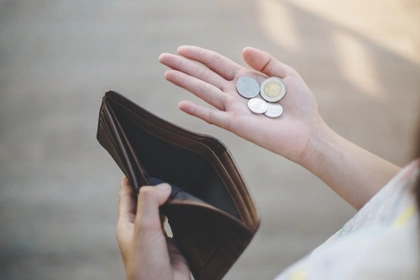When is it best to apply with a guarantor?
You may want to apply for a loan with a guarantor if you have a thin or poor credit history and need to access finance. A guarantor loan provider may place less emphasis on your credit history when you apply, so you might find it easier to get accepted for this type of loan.
Because a guarantor formally agrees to take over your loan repayments if you can’t pay them, the lender may be more willing to overlook a damaged credit history.
Lenders will look at your guarantor’s credit history and financial circumstances. So, it’s important that your guarantor has a good credit history, otherwise, your application for a guarantor personal loan may be rejected.
Guarantor loans often come with a far higher rate of interest attached to them than a regular personal loan for the same amount. Having said this, guarantor loans often have lower interest rates than payday loans. If you are choosing between the two and know somebody who has a good credit history and is willing to be your guarantor, then a guarantor personal loan may be right for you.
It is important to consider all options available to you before making a decision. There are lenders who specialise in loans for bad credit and you may be eligible for other types of loans.
How to improve your chances of being accepted for a loan
If you’re wondering how to get a loan without a guarantor, there are some steps you can take to improve your credit rating:
- Your credit score can be damaged by something as straightforward as an old address or bank account showing on your report. By checking your credit score regularly and making sure all your details are up to date, you could improve your chances of accessing credit. You can check your credit report with the three main credit reference agencies in the UK (Experian, Equifax and TransUnion). You can also check your credit report for free (for life) with our member-only platform, CredAbility.
- Limit your credit applications because every time you apply for credit card it will show up on your credit report. Multiple credit applications made in a short space of time could damage your credit score and mean you’re less likely to be accepted for the product you’re hoping for.
- Use eligibility checkers before applying for credit, then you can see if you’re likely to be accepted. This avoids leaving ‘hard footprints’ on your credit report for lenders to see, as it only performs a soft search. While this won’t actively improve your credit score, it will stop it from being damaged by multiple credit applications.
How to apply for a personal loan with a guarantor
Follow these four steps to apply for a loan with a guarantor:
1. You need to find someone to formally act as your guarantor for the credit. This means they must agree to take over your repayments if you are no longer able – or willing – to make them. You’ll need a guarantor with a good credit history, otherwise you risk not being accepted for the loan.
2. Next you should talk over the possibility of getting a guarantor personal loan with your proposed guarantor. Both of you should be fully aware that if you stop making repayments on your loan, the lender can chase the guarantor for these funds. For this reason, it’s crucial that the person acting as guarantor is sure they can afford (and is happy) to take over your repayments in any situation where you stop making them.
3. Do a soft search for guarantor personal loans to find the best one for you. Once you have found one that you want to apply for, speak to your guarantor to see if you are both happy with the chosen loan. You should also use an eligibility checker to see whether you’re likely to be accepted, without marking your credit history.
4. Only borrow an amount where you can make the agreed repayments in full and on time each month. If you stop making these repayments, the lender can chase the guarantor for these funds. As the guarantor becomes equally liable for the repayments, their credit history is also at risk if they don’t make them. You may also risk damaging your personal relationship with them.
Are guarantor loans expensive?
The interest rate on a guarantor loan will be less than a payday loan, but it is still going to be higher than a conventional personal loan from a bank.
While secured loans normally have interest rates that start from under 5% APR, guarantor loans often charge over 30% APR. This is because although the lender has the assurance of the guarantor, it’s difficult for them to make a judgement on your ability to pay because you have a poor credit history.
It’s important to note that if you have a thin or poor credit history you may find yourself paying a higher interest rate on any type of credit you take out - not just a guarantor personal loan. Make sure you consider all the options carefully before deciding which type of credit to apply for.
What other options are available?
If you’re worried about the level of risk involved to you and your guarantor with this type of loan, there are alternatives you may want to consider. Some lenders specialise in providing finance to customers who either have a poor credit history or who have not borrowed before (and so have not had chance to build up a credit history yet).
Credit unions are cooperatives set up to provide financial services to people in a certain area or profession. They often have different lending criteria to the major banks and building societies, so you may be eligible for a loan with them even if you have bad credit.
Peer-to-peer lending is a scheme that matches borrowers with alternative lenders to those operating on the high street. Similar to credit unions, alternative lenders may be able to provide you with credit when a bank or building society can’t.
You can also use a credit builder card to help you access better finance options and improve your credit history. A credit building credit card (or credit card for bad credit) works like a normal credit card, but it’s designed for people who have a thin or poor credit history.. If you make your payments in full and on time each month, your credit score will start to improve.
However, you may find yourself paying a high interest rate with one of these options (to offset the risk to the lender). They often come with a low credit limit too. This is why it’s important to consider all of the options available to you before making a decision. Remember, missing payments or making late payments will damage your credit score and could lead you further into debt. Late fees may apply.
Alternatively, you could approach a family member or friend to see if they’d be willing to lend you the money you need. It’s vital that you agree to a clear payment plan and that you stick to it – otherwise, your relationship could be jeopardised. It may be worth having a solicitor draw up a payment plan you both sign, to avoid any confusion later down the line.
Disclaimer: We make every effort to ensure content is correct when published. Information on this website doesn't constitute financial advice, and we aren't responsible for the content of any external sites.






